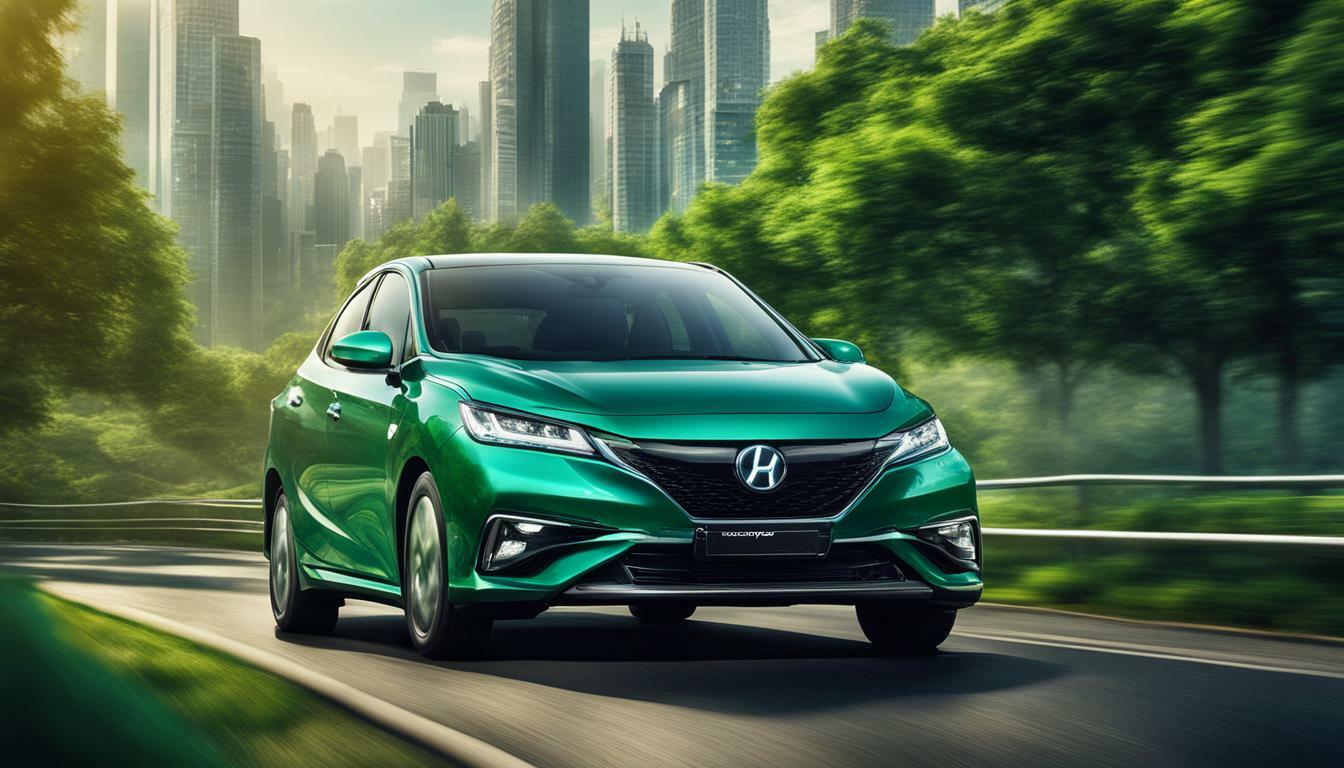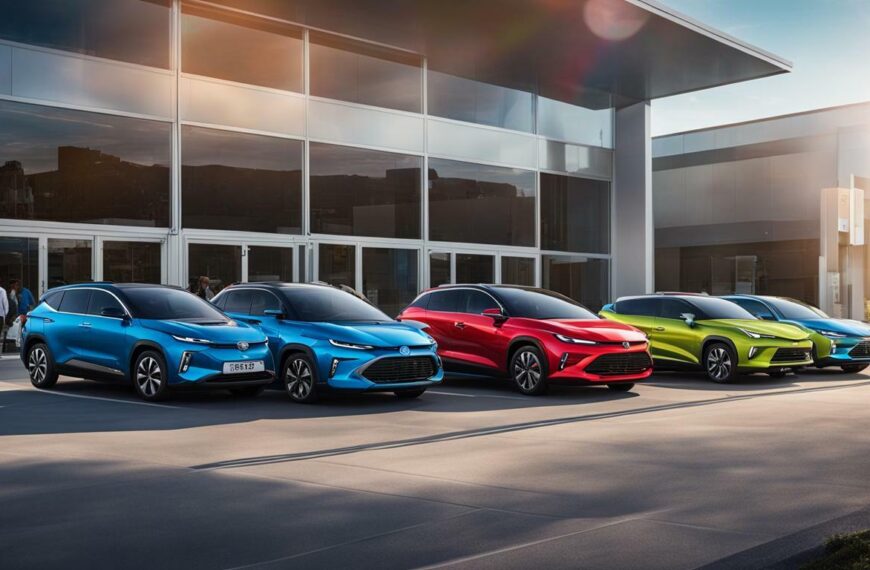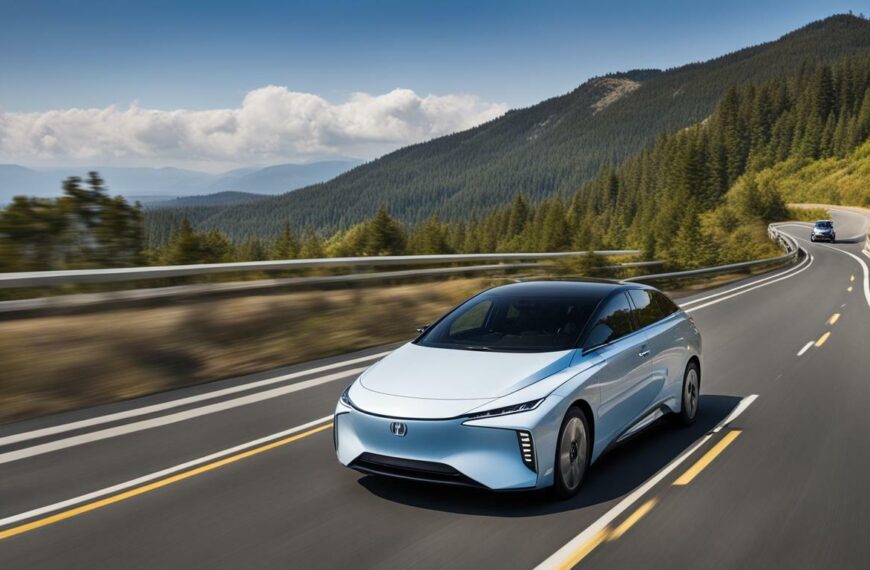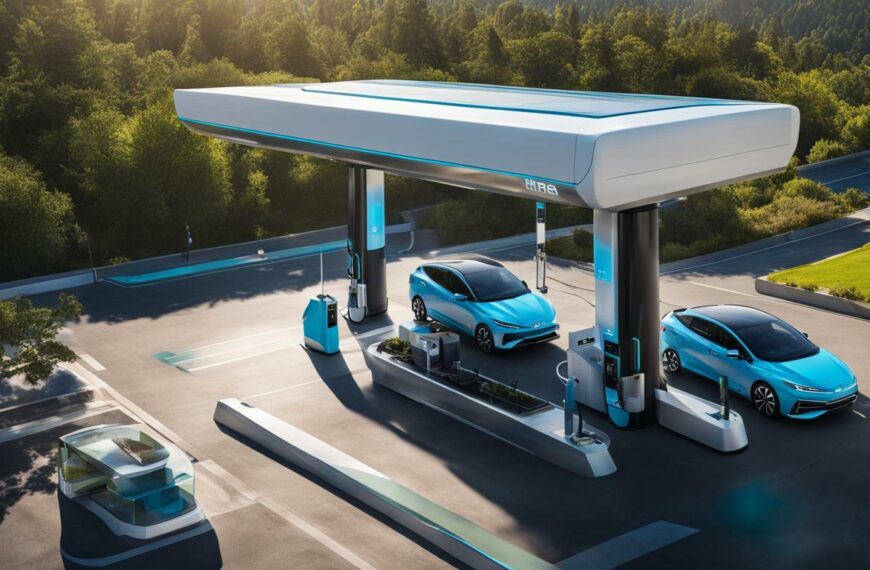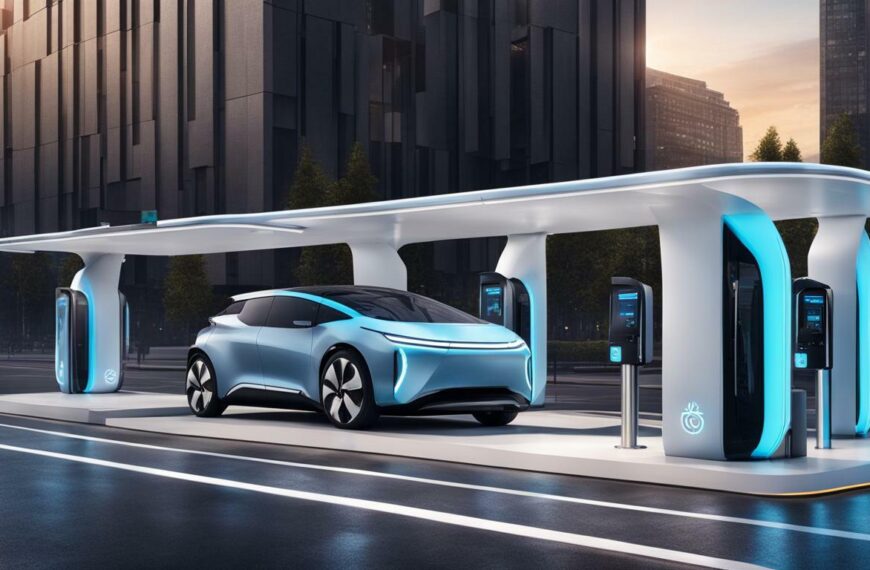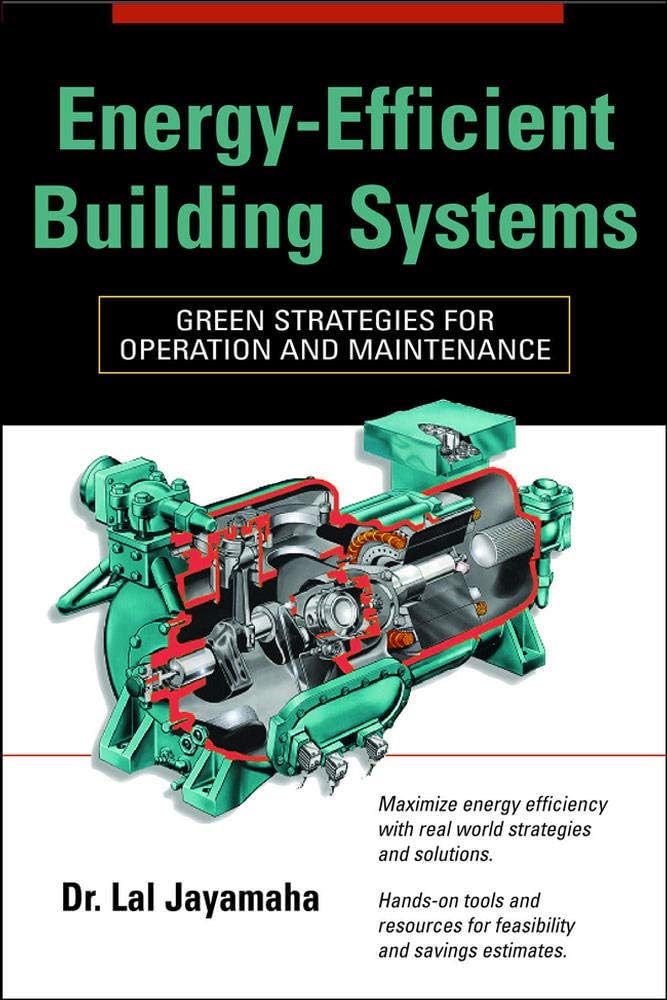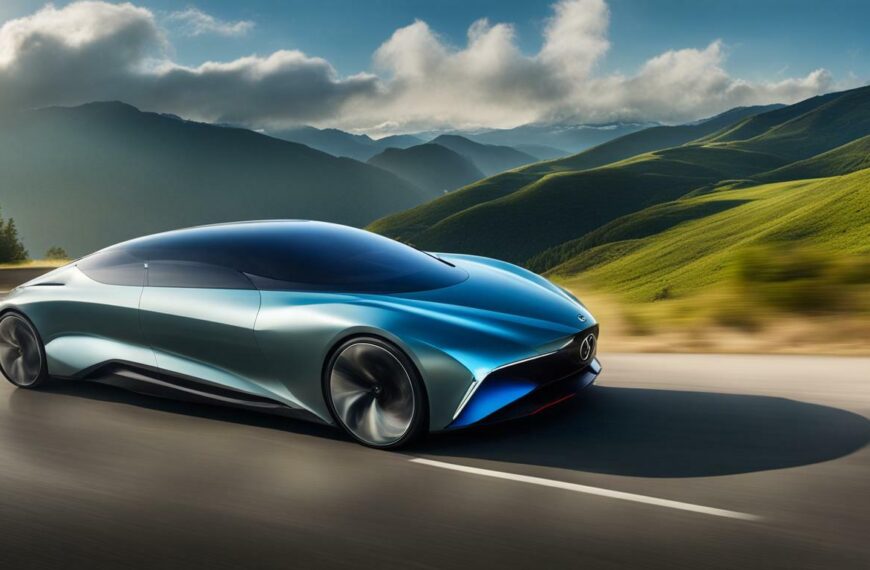Hydrogen cars have emerged as a promising solution for a cleaner and greener future, offering significant environmental benefits. These vehicles have the potential to reduce carbon emissions and improve air quality, making them a breath of fresh air for the environment. By harnessing the power of hydrogen fuel cells, these cars can help reduce our dependence on traditional fuels and pave the way for a more sustainable transportation sector.
Key Takeaways:
- Hydrogen cars have the potential to significantly reduce carbon emissions and improve air quality.
- By 2050, hydrogen-powered vehicles could save up to 68 million tonnes of fuel and eliminate almost 200 million tonnes of carbon emissions.
- Hydrogen fuel-cell vehicles produce only water vapor as emissions, making them a clean alternative to gasoline or diesel cars.
- The use of hydrogen in transportation can help mitigate the single biggest contributor to climate change – the transportation sector.
- Advancements in technology and the use of renewable energy sources are expected to make hydrogen production cleaner and more cost-effective in the future.
With their potential to reduce greenhouse gas emissions and improve air quality, hydrogen cars are revolutionizing the transportation sector. However, the widespread adoption of hydrogen as a fuel source still relies on increasing the use of renewable energy in the production process. The long-haul trucking industry, with its inherent need for longer range and faster refueling times, is a promising sector for hydrogen adoption. Although hydrogen production is currently more expensive than traditional fuels and the infrastructure for hydrogen refueling stations is still developing, the environmental benefits of hydrogen cars cannot be ignored. As we strive for a cleaner and greener future, hydrogen cars offer a breath of fresh air for the environment.
The Environmental Advantages of Hydrogen Cars
Hydrogen cars represent a breakthrough in eco-friendly transportation, as they produce zero emissions and contribute to a more sustainable and cleaner environment. These vehicles use hydrogen fuel cells, which convert hydrogen and oxygen into electricity, powering the car’s motor and emitting only water vapor as a byproduct.
According to research, by 2050, the widespread use of hydrogen-powered vehicles could save up to 68 million tonnes of fuel and eliminate almost 200 million tonnes of carbon emissions. This reduction in carbon emissions is crucial as the transportation sector is the single biggest contributor to climate change. The use of hydrogen in transportation offers a viable solution to combat this issue and move towards a greener future.
Furthermore, hydrogen-powered transportation is not limited to passenger vehicles alone. Manufacturers are exploring its potential in various sectors, including trucks, commercial vehicles, planes, and trains. The long-haul trucking industry, in particular, holds promise for hydrogen adoption due to the longer range and faster refueling time of fuel cells compared to electric batteries.
The Potential of Hydrogen Cars in Sustainable Transportation
Hydrogen cars have the potential to revolutionize the way we travel and contribute to a more sustainable transportation system. The zero-emission nature of these vehicles not only improves air quality but also reduces our dependence on fossil fuels. By replacing traditional gasoline or diesel-powered cars with hydrogen fuel-cell vehicles, we can significantly reduce the carbon footprint associated with transportation.
However, the widespread adoption of hydrogen as a fuel source is still dependent on overcoming certain challenges. One of the key considerations is the production process itself. Currently, hydrogen production contributes to pollution, making it less environmentally friendly compared to other fuels. However, advancements in technology and the use of renewable energy sources can address this issue, making hydrogen production cleaner and more cost-effective in the future.
Another important aspect to consider is the infrastructure required to support hydrogen-powered transportation. Currently, the network of hydrogen refueling stations is not as well-developed as gasoline or electric charging stations. Further infrastructure development is needed to make refueling convenient and accessible for hydrogen car owners. As technology and infrastructure progress, hydrogen cars have the potential to play a significant role in reducing greenhouse gas emissions, improving air quality, and fostering a more sustainable future for transportation.
| Advantages of Hydrogen Cars | |
|---|---|
| Zero emissions | Contributes to a cleaner environment |
| Potential to reduce carbon footprint | Improves air quality |
| Long-range capabilities | Promotes sustainable transportation |
| Fast refueling time | Contributes to a greener future |
Hydrogen cars offer a promising solution to address the environmental impact of transportation. The transition to hydrogen-powered vehicles presents an opportunity to reduce carbon emissions, conserve energy, and create a more sustainable and cleaner transportation system for future generations.
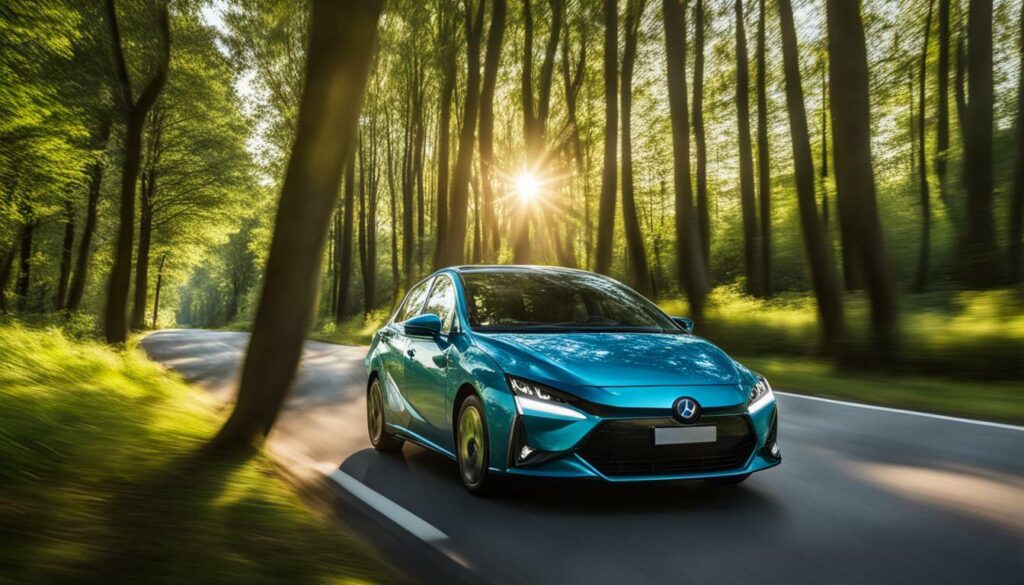
By embracing hydrogen cars, we can significantly reduce our carbon footprint and pave the way for a greener future. These clean energy vehicles offer a promising solution to the environmental challenges we face today. Hydrogen-powered transportation has gained traction due to its potential to reduce carbon emissions and improve air quality.
According to studies, hydrogen-powered vehicles have the capability to save up to 68 million tonnes of fuel and eliminate almost 200 million tonnes of carbon emissions by 2050. Unlike gasoline or diesel-powered cars, hydrogen fuel-cell vehicles produce only water vapor as emissions, making them an eco-friendly alternative. This makes hydrogen cars an important part of the green transport technologies that are needed to combat climate change.
Various sectors, including trucks, commercial vehicles, planes, trains, and passenger vehicles, have begun embracing hydrogen as an energy source. However, the widespread adoption of hydrogen as a fuel source is dependent on increasing the use of renewable energy in the production process. This is necessary to ensure that hydrogen production becomes cleaner and more sustainable in the long run.
| Hydrogen Cars | Carbon Emissions Reduction |
|---|---|
| 68 million tonnes of fuel saved | by 2050 |
| Almost 200 million tonnes of carbon emissions eliminated | by 2050 |
The long-haul trucking industry is considered a promising sector for hydrogen adoption. Hydrogen fuel cells offer longer range and faster refueling time compared to electric batteries, making them an attractive choice for this sector. However, it is important to note that hydrogen production is currently more expensive than traditional fuels, and the infrastructure for hydrogen refueling stations is still in its early stages of development. Government support and investment are crucial in accelerating the infrastructure development and making hydrogen vehicles more accessible to the masses.

While there are still challenges to overcome, hydrogen cars hold immense potential in reducing greenhouse gas emissions and improving air quality. It is essential that we continue to advance technology and invest in renewable energy sources to make hydrogen production cleaner and more cost-effective. By doing so, we can create a sustainable transportation system that benefits both the environment and future generations.
The Growing Role of Hydrogen in Transportation
Hydrogen is increasingly being embraced as a fuel source in transportation, offering numerous benefits through its fuel cell technology and potential to reshape the industry. As the world seeks sustainable transportation solutions, hydrogen-powered vehicles have emerged as a promising alternative to traditional fossil fuel-powered cars.
Unlike gasoline or diesel-powered vehicles that emit harmful greenhouse gases, hydrogen fuel-cell vehicles produce only water vapor as emissions, making them a clean and environmentally friendly option. This zero-emission capability positions hydrogen cars as a key player in reducing carbon emissions and improving air quality in the transportation sector. By 2050, these vehicles could save up to 68 million tonnes of fuel and eliminate nearly 200 million tonnes of carbon emissions, making a significant impact on the fight against climate change.
The potential of hydrogen extends beyond passenger vehicles, as manufacturers also explore its use in trucks, commercial vehicles, planes, trains, and other modes of transportation. The long-haul trucking industry, in particular, stands out as a promising sector for hydrogen adoption. Hydrogen fuel cells offer longer ranges and faster refueling times compared to electric batteries, making them a viable alternative for long-distance transportation. This not only reduces greenhouse gas emissions but also addresses the practical concerns of businesses that rely on efficient and time-sensitive transportation.
| Hydrogen Fuel Cell Benefits |
|---|
| Zero Emissions: Hydrogen fuel-cell vehicles produce only water vapor as emissions, contributing to cleaner air and improved public health. |
| Reduced Carbon Footprint: By utilizing hydrogen as a fuel source, transportation can significantly reduce its carbon footprint, helping combat climate change. |
| Longer Ranges and Faster Refueling: Hydrogen fuel cells offer increased range and faster refueling times compared to electric batteries, making them suitable for long-haul transportation. |
| Diverse Applications: Hydrogen has the potential to power various modes of transportation, including trucks, commercial vehicles, planes, trains, and passenger cars. |
However, challenges remain for the widespread adoption of hydrogen as a fuel source. Currently, hydrogen production is more expensive than traditional fuels, and the infrastructure for hydrogen refueling stations is not yet well-developed. To fully realize the potential of hydrogen-powered transportation, increased investment in renewable energy sources and infrastructure development is crucial.

The Potential Impact on Climate Change
The adoption of hydrogen cars holds immense potential in reducing carbon emissions and driving forward an eco-conscious automobile industry. Hydrogen fuel-cell vehicles produce only water vapor as emissions, making them a clean alternative to cars fueled by gasoline or diesel. This significant reduction in carbon emissions can have a profound impact on mitigating climate change, particularly as transportation is the single biggest contributor to global greenhouse gas emissions.
By 2050, it is estimated that hydrogen-powered vehicles could save up to 68 million tonnes of fuel and eliminate almost 200 million tonnes of carbon emissions. This reduction in emissions is a significant step towards achieving global sustainability goals and improving air quality. As manufacturers embrace hydrogen-powered transportation across various sectors, including trucks, commercial vehicles, planes, trains, and passenger vehicles, the potential for a greener and more environmentally friendly transportation system becomes increasingly feasible.
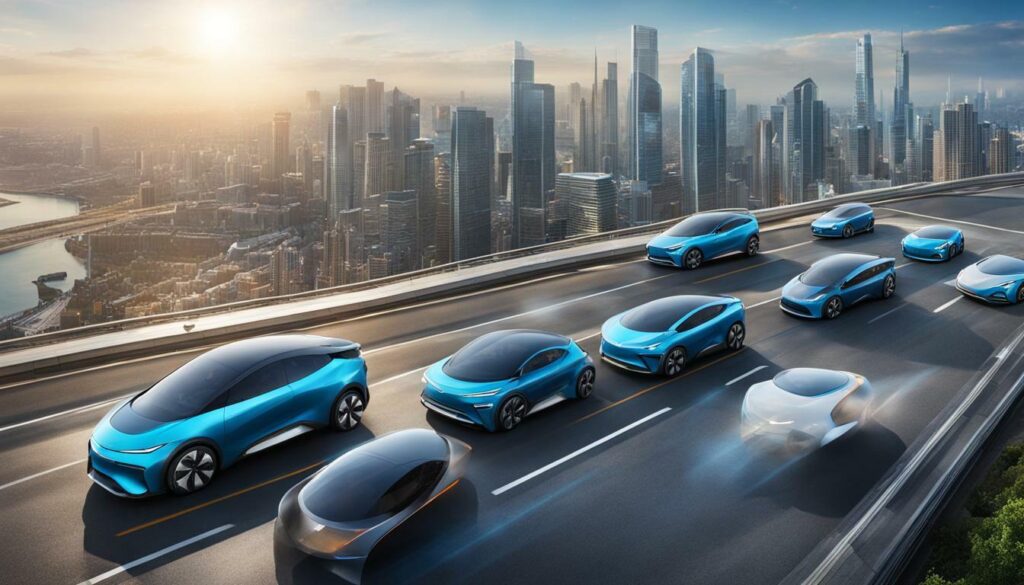
However, to fully realize the potential of hydrogen cars in combating climate change, the production process must rely on renewable energy sources. Currently, hydrogen production contributes to pollution, and the widespread adoption of hydrogen fuel-cell vehicles depends on transitioning away from non-renewable energy sources. Advancements in technology and the use of renewable energy are critical to making hydrogen production cleaner and more cost-effective, ultimately ensuring a sustainable future for hydrogen cars.
In the shift towards a hydrogen-based transportation system, the long-haul trucking industry stands out as a promising sector for hydrogen adoption. Fuel cells offer longer ranges and faster refueling times compared to electric batteries. This advantage makes hydrogen fuel-cell vehicles a viable option for long-haul journeys, where efficiency and quick refueling are crucial. However, it is important to note that despite the promise of hydrogen cars, the current expense of hydrogen production and the need for further infrastructure development, particularly in the network of hydrogen refueling stations, pose challenges to widespread adoption.
Summary
- Hydrogen cars have the potential to reduce carbon emissions and drive an eco-conscious automobile industry.
- Hydrogen fuel-cell vehicles emit only water vapor, making them a clean alternative to gasoline or diesel cars.
- By 2050, hydrogen-powered vehicles could save millions of tonnes of fuel and eliminate hundreds of millions of tonnes of carbon emissions.
- Renewable energy sources are crucial for making hydrogen production cleaner and more cost-effective.
- The long-haul trucking industry holds promise for hydrogen adoption due to the longer range and faster refueling time of fuel cells.
- Challenges such as the current expense of hydrogen production and the need for infrastructure development limit widespread adoption.

Overcoming Challenges and Advancing Technology
Despite the current challenges, advancements in technology and the utilization of renewable energy sources are expected to pave the way for cleaner and more cost-effective hydrogen production.
One of the main challenges in hydrogen production is the current reliance on fossil fuels, which contribute to carbon emissions. However, researchers are actively exploring methods to produce hydrogen using renewable energy sources such as wind and solar power. By harnessing these clean energy technologies, the environmental impact of hydrogen production can be significantly reduced.
“Renewable energy is key to unlocking the full potential of hydrogen as a sustainable fuel source. By integrating renewable energy sources into the hydrogen production process, we can minimize our reliance on traditional fossil fuels, resulting in cleaner and more efficient production methods.”
Furthermore, advancements in technology are driving innovation in hydrogen production. Electrolysis, for example, is a process that uses an electric current to split water molecules into hydrogen and oxygen. This method, coupled with improvements in the efficiency of electrolyzers, is making hydrogen production more energy-efficient and cost-effective.
| Advancements in Hydrogen Production Technology | Benefits |
|---|---|
| Advanced Electrolyzers | Increased efficiency and reduced energy consumption |
| Carbon Capture and Storage | Minimizes carbon emissions during hydrogen production |
| Biohydrogen Production | Utilizes organic waste materials to produce hydrogen |
Investments in research and development are also accelerating the progress of hydrogen production. Governments, private companies, and academic institutions are joining forces to find innovative solutions and overcome the technical and financial barriers that currently limit hydrogen’s widespread adoption. The goal is to create a sustainable hydrogen economy that can address both energy and environmental challenges.
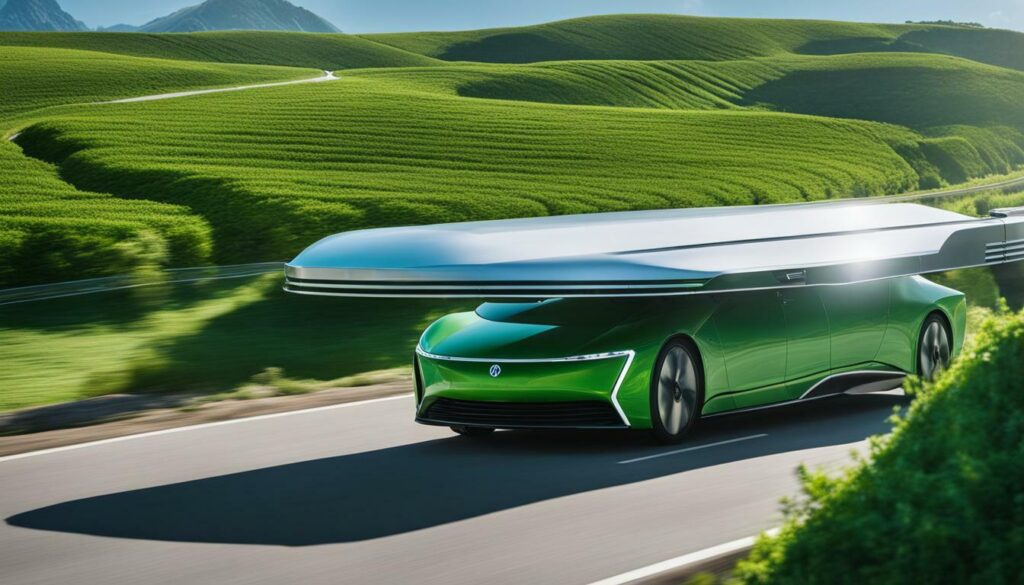
Promising Sectors for Hydrogen Adoption
The long-haul trucking industry is poised to benefit greatly from hydrogen adoption, thanks to the extended range and faster refueling time offered by fuel cells. As the industry looks for sustainable alternatives to reduce emissions, hydrogen-powered trucks are emerging as a promising solution. These vehicles can travel longer distances without compromising on performance, making them ideal for long-haul transportation.
Hydrogen fuel cells provide a viable option for the trucking industry, offering numerous advantages over traditional diesel engines. With faster refueling times compared to electric batteries, hydrogen-powered trucks can minimize downtime and increase overall efficiency. Additionally, the extended range of these vehicles eliminates concerns about limited driving distances, making them well-suited for long-haul operations.
Furthermore, hydrogen adoption in the long-haul trucking industry aligns with efforts to reduce carbon emissions and combat climate change. The transportation sector is a major contributor to greenhouse gas emissions, and transitioning to hydrogen-powered vehicles can significantly reduce its environmental impact. By embracing this clean and efficient technology, the industry can play a crucial role in creating a more sustainable future.
Advantages of Hydrogen for Long-Haul Trucking
Hydrogen-powered trucks have several key advantages that make them an attractive option for the long-haul industry. Firstly, their extended range allows for longer trips without the need for frequent refueling, providing greater flexibility and reducing downtime. Additionally, hydrogen fuel cells offer faster refueling times compared to electric batteries, enabling quicker turnarounds and increased productivity.
Moreover, hydrogen fuel cells are known for their high energy efficiency and zero-emission performance. This means that not only do they produce clean and sustainable energy, but they also help improve air quality and reduce harmful emissions. As the long-haul trucking industry seeks to meet stringent environmental regulations and reduce its carbon footprint, hydrogen adoption presents an innovative and promising solution.
| Advantages of Hydrogen for Long-Haul Trucking |
|---|
| Extended range for longer trips |
| Faster refueling times compared to electric batteries |
| High energy efficiency and zero-emission performance |
| Improved air quality and reduced harmful emissions |
With the ongoing advancements in hydrogen technology and the increasing availability of renewable energy sources, the future looks promising for hydrogen adoption in the long-haul trucking industry. As more companies recognize the benefits of hydrogen fuel cells, we can expect to see a gradual shift towards cleaner and more sustainable transportation.

While hydrogen cars offer numerous benefits, it is crucial to address considerations such as the current expense of hydrogen production and the need for more widespread infrastructure development, specifically in the availability of hydrogen refueling stations. The production of hydrogen is still relatively expensive compared to traditional fuels, primarily due to the high cost of electricity required for the electrolysis process. However, advancements in technology and the increasing use of renewable energy sources are expected to drive down production costs, making hydrogen a more cost-effective fuel option in the future.
Infrastructure development is another key aspect that needs to be considered for the widespread adoption of hydrogen cars. At present, the network of hydrogen refueling stations is not yet well-developed, posing a barrier to the accessibility and convenience of hydrogen fuel. To address this issue, it is essential to invest in the establishment of a robust and extensive refueling infrastructure, making hydrogen refueling stations as common and accessible as conventional gasoline stations. Only then will hydrogen cars become a viable and practical option for consumers.
It is worth noting that efforts are already underway to address these considerations and promote the development of hydrogen infrastructure. Government initiatives and collaborations between private companies are seeking to accelerate the deployment of hydrogen refueling stations and overcome the challenges associated with their establishment. As the infrastructure for hydrogen fuel becomes more widespread and accessible, the potential for hydrogen cars to make a significant impact on reducing greenhouse gas emissions and improving air quality becomes even more promising.
| Expense of Hydrogen Production | Infrastructure Development |
|---|---|
| Currently more expensive than traditional fuels | Network of hydrogen refueling stations is limited |
| Advancements in technology and renewable energy use expected to drive down production costs | Investment needed to establish a robust and extensive refueling infrastructure |
| Government initiatives and private collaborations aim to overcome challenges and promote hydrogen infrastructure | Efforts are underway to accelerate the deployment of hydrogen refueling stations |
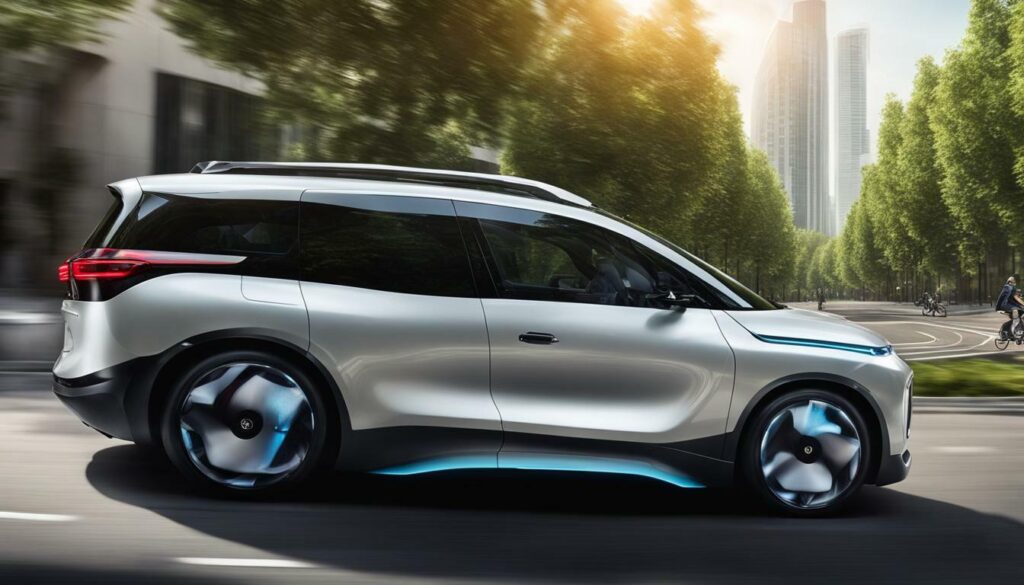
Conclusion
In conclusion, hydrogen cars have the potential to be a game-changer in reducing greenhouse gas emissions and improving air quality, offering a cleaner and more sustainable future for the transportation industry. These vehicles are seen as a breath of fresh air for the environment, thanks to their ability to significantly reduce carbon emissions and contribute to a cleaner atmosphere. By 2050, the widespread adoption of hydrogen-powered vehicles could save up to 68 million tonnes of fuel and eliminate almost 200 million tonnes of carbon emissions, making a significant impact on the fight against climate change.
One of the key environmental benefits of hydrogen cars is the fact that they produce only water vapor as emissions. This makes them a clean alternative to traditional cars fueled by gasoline or diesel, which release harmful pollutants into the atmosphere. As transportation is the single biggest contributor to climate change, embracing hydrogen-powered transportation is crucial in reducing carbon emissions and improving air quality on a global scale.
Hydrogen-powered vehicles have gained traction in various sectors, including trucks, commercial vehicles, planes, trains, and passenger cars. The long-haul trucking industry, in particular, is considered a promising sector for hydrogen adoption. This is due to the fuel cells’ longer range and faster refueling time compared to electric batteries, offering practical advantages for industries that require extensive transportation capabilities.
While hydrogen production currently adds to pollution, advancements in technology and the use of renewable energy sources hold the key to making hydrogen production cleaner and more cost-effective in the future. However, it is important to note that hydrogen production is currently more expensive than traditional fuels, and the infrastructure for hydrogen refueling stations is not yet well-developed. Continued investment in renewable energy and infrastructure development is vital to support the widespread adoption of hydrogen as a fuel source.
Overall, hydrogen cars present a promising solution to the environmental challenges faced by the transportation industry. With their potential to reduce greenhouse gas emissions and improve air quality, these vehicles offer a cleaner, more sustainable future. As technology continues to advance and investment in renewable energy grows, hydrogen cars have the potential to revolutionize the way we travel, paving the way towards a greener and more eco-conscious automobile industry.
FAQ about Hydrogen Cars
How do hydrogen cars reduce carbon emissions?
Hydrogen cars produce only water vapor as emissions, making them a cleaner alternative to cars fueled by gasoline or diesel. By using hydrogen fuel-cell technology, these vehicles eliminate almost 200 million tonnes of carbon emissions and contribute to reducing greenhouse gas emissions.
Are hydrogen cars eco-friendly?
Yes, hydrogen cars are considered eco-friendly as they are zero-emission vehicles. They do not emit any harmful pollutants into the air, improving air quality and promoting sustainable transportation.
Can hydrogen cars help in reducing the carbon footprint?
Absolutely. Hydrogen cars utilize clean energy and innovative green transport technologies, which contribute to reducing the carbon footprint. By adopting hydrogen-powered transportation, we can make significant strides in addressing climate change and promoting a more sustainable future.
How is hydrogen fuel being embraced in transportation?
Hydrogen fuel is being embraced by manufacturers of trucks, commercial vehicles, planes, trains, and passenger vehicles. It has become a promising and growing technology in the transportation sector, offering numerous benefits in fuel cell technology and sustainable transportation.
What impact can hydrogen cars have on climate change?
Hydrogen cars have the potential to significantly reduce carbon emissions, particularly in the transportation sector, which is a major contributor to climate change. By transitioning to hydrogen-powered vehicles, we can play a crucial role in mitigating the effects of climate change and building a more eco-conscious automobile industry.
How can the challenges of hydrogen production be overcome?
Advancements in technology, coupled with the use of renewable energy sources, can help overcome the challenges of hydrogen production. By increasing the use of renewable energy in the production process, we can make hydrogen production cleaner and more cost-effective in the future.
Which sectors are promising for hydrogen adoption?
The long-haul trucking industry is considered a promising sector for hydrogen adoption. Hydrogen fuel cells offer longer range and faster refueling time compared to electric batteries, making them a favorable option for this industry.
Are there any considerations for hydrogen adoption?
It is important to note that hydrogen production is currently more expensive than traditional fuels, and the infrastructure for hydrogen refueling stations is not yet well-developed. However, with further advancements in technology and infrastructure development, these barriers can be overcome, paving the way for wider adoption of hydrogen as a fuel source.
How can hydrogen cars improve air quality?
Hydrogen cars produce only water vapor as emissions, resulting in improved air quality. By transitioning to hydrogen-powered vehicles, we can reduce the release of harmful pollutants into the atmosphere and promote cleaner and healthier environments.
Source Links
- https://www.climatech2ampion.org/pocket-guides/how-does-hydrogen-benefit-transport/
- https://www.greencarreports.com/news/1131268_toyota-claims-the-2021-mirai-fuel-cell-car-cleans-the-air-calls-it-minus-emissions
- https://apnews.com/article/technology-joe-biden-business-environment-and-nature-climate-change-5913fff50378b5706769463a2b02dfca
